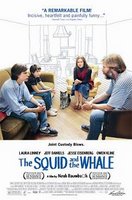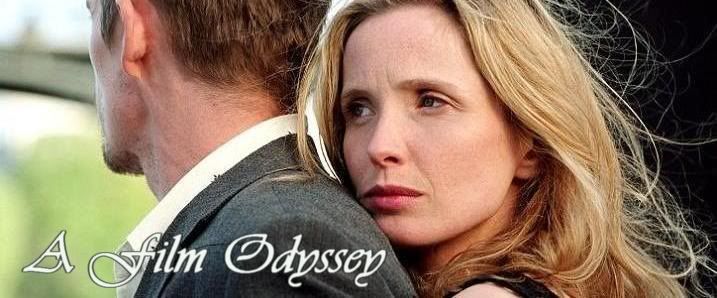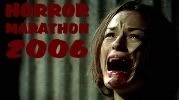
Familial dysfunction is the accepted norm in Noam Baumbach’s semi-autobiographical
The Squid and the Whale. While that element gives the film a tinge of reminiscent nostalgia even as the conflicts at hand wage mental and emotional distraught in all directions, the knowing overtone that being fucked up is pretty much the norm also gives the film the freedom to suggest a wholly realistic opportunity for something better to come out of the present chaos. “Joint custody blows” becomes the unofficial motto for offspring Walt (Jesse Eisenberg) and Frank (Owen Cline) when their parents Bernard (Jeff Daniels) and Joan (Laura Linney) separate in 1986 after eighteen years of marriage and almost half a decade of hidden turmoil. Walt and Frank (“chicken” and “pickle,” respectively) take allegiances with their father and mother (also respectively), and both the natural destruction of the family unit as well as overtones of selfishness and greed on their parents’ parts take their tolls on the impressionable youth. The titular metaphor stands in both for the aggressive negotiations often seen in a family as well as a reflection of the uneasy sexual maturation of both the pubescent Frank (who exhibits common Freudian obsessions) and the older Walt (whose navigations in the world of dating are not unlike that of a mine field). When Walt claims Pink Floyd’s “Hey You” as his own work in a school talent show, the fact that his disguised cry for help goes almost completely unheard makes his struggles even more poignant.
The Squid and the Whale features perhaps the best ensemble cast of any film from 2005, the standout here being Jeff Daniels in a career-high, incredibly nuanced performance that brings great humanity to a largely unpleasant persona. The largely handheld camerawork compliments the natural aesthetic, aiding the film to capture reality rather than simulate it in this reflective and provoking slice of often tarnished but absolutely real life, a reminder that both trials and pain can be as beautiful an experience as any other.




 Familial dysfunction is the accepted norm in Noam Baumbach’s semi-autobiographical The Squid and the Whale. While that element gives the film a tinge of reminiscent nostalgia even as the conflicts at hand wage mental and emotional distraught in all directions, the knowing overtone that being fucked up is pretty much the norm also gives the film the freedom to suggest a wholly realistic opportunity for something better to come out of the present chaos. “Joint custody blows” becomes the unofficial motto for offspring Walt (Jesse Eisenberg) and Frank (Owen Cline) when their parents Bernard (Jeff Daniels) and Joan (Laura Linney) separate in 1986 after eighteen years of marriage and almost half a decade of hidden turmoil. Walt and Frank (“chicken” and “pickle,” respectively) take allegiances with their father and mother (also respectively), and both the natural destruction of the family unit as well as overtones of selfishness and greed on their parents’ parts take their tolls on the impressionable youth. The titular metaphor stands in both for the aggressive negotiations often seen in a family as well as a reflection of the uneasy sexual maturation of both the pubescent Frank (who exhibits common Freudian obsessions) and the older Walt (whose navigations in the world of dating are not unlike that of a mine field). When Walt claims Pink Floyd’s “Hey You” as his own work in a school talent show, the fact that his disguised cry for help goes almost completely unheard makes his struggles even more poignant. The Squid and the Whale features perhaps the best ensemble cast of any film from 2005, the standout here being Jeff Daniels in a career-high, incredibly nuanced performance that brings great humanity to a largely unpleasant persona. The largely handheld camerawork compliments the natural aesthetic, aiding the film to capture reality rather than simulate it in this reflective and provoking slice of often tarnished but absolutely real life, a reminder that both trials and pain can be as beautiful an experience as any other.
Familial dysfunction is the accepted norm in Noam Baumbach’s semi-autobiographical The Squid and the Whale. While that element gives the film a tinge of reminiscent nostalgia even as the conflicts at hand wage mental and emotional distraught in all directions, the knowing overtone that being fucked up is pretty much the norm also gives the film the freedom to suggest a wholly realistic opportunity for something better to come out of the present chaos. “Joint custody blows” becomes the unofficial motto for offspring Walt (Jesse Eisenberg) and Frank (Owen Cline) when their parents Bernard (Jeff Daniels) and Joan (Laura Linney) separate in 1986 after eighteen years of marriage and almost half a decade of hidden turmoil. Walt and Frank (“chicken” and “pickle,” respectively) take allegiances with their father and mother (also respectively), and both the natural destruction of the family unit as well as overtones of selfishness and greed on their parents’ parts take their tolls on the impressionable youth. The titular metaphor stands in both for the aggressive negotiations often seen in a family as well as a reflection of the uneasy sexual maturation of both the pubescent Frank (who exhibits common Freudian obsessions) and the older Walt (whose navigations in the world of dating are not unlike that of a mine field). When Walt claims Pink Floyd’s “Hey You” as his own work in a school talent show, the fact that his disguised cry for help goes almost completely unheard makes his struggles even more poignant. The Squid and the Whale features perhaps the best ensemble cast of any film from 2005, the standout here being Jeff Daniels in a career-high, incredibly nuanced performance that brings great humanity to a largely unpleasant persona. The largely handheld camerawork compliments the natural aesthetic, aiding the film to capture reality rather than simulate it in this reflective and provoking slice of often tarnished but absolutely real life, a reminder that both trials and pain can be as beautiful an experience as any other.




